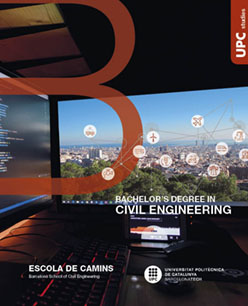Bachelor's degree in Civil Engineering
Barcelona School of Civil Engineering (ETSECCPB)
Civil engineers are professionals who have good analytical and decision-making skills, which allow them to find efficient and sustainable solutions to complex technological and engineering problems. They are graduates who are professionally qualified to plan, manage, construct and conserve civil engineering projects. On this bachelor's degree you will acquire a solid grounding and broad mastery of technical knowledge and work management skills.
Civil engineers are already contributing to meeting the UN's Sustainable Development Objectives, and civil engineering is a versatile area of knowledge that is present in a great number of spheres of action, many of them emerging and strategic, such as sustainable mobility, water supply, renewable energies and the energy transition, smart cities, just-in-time logistics, the circular economy and climate change.
Civil engineers are already contributing to meeting the UN's Sustainable Development Objectives, and civil engineering is a versatile area of knowledge that is present in a great number of spheres of action, many of them emerging and strategic, such as sustainable mobility, water supply, renewable energies and the energy transition, smart cities, just-in-time logistics, the circular economy and climate change.
- Professional opportunities
- Civil engineers join companies dealing with infrastructure, water flows, energy, goods and people as specialists, managers, designers, consultants and builders; ports, airports, stations and logistics centres; companies and institutions that manage natural resources and recycling and that intervene in the public use of cities; and consultancies and quality laboratories.
- Sustainable and safe mobility
- Universal right to water supply
- Renewable energies and the energy transition
- Mitigation of causes and effects of climate change
- Resilience to natural disasters
- Circular economy
- Smart cities
- Just-in-time logistics
- Transport infrastructure for intelligent mobility
- Roads and channels that move water, energy, goods and people
- Ports, airports, stations and logistics centres
- Natural resource and waste recycling management systems
- Public spaces in cities




